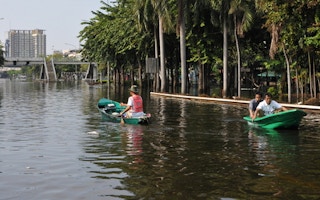Some future impacts of climate change, such as more extremes of heat and sea level rise, are unavoidable even if governments act fast to cut greenhouse gas emissions, the World Bank said on Sunday.
Past and predicted emissions from power plants, factories and cars have locked the globe on a path towards an average temperature rise of almost 1.5 degrees Celsius (2.7 Fahrenheit) above pre-industrial times by 2050, it said.
“This means that climate change impacts such as extreme heat events may now be simply unavoidable,” World Bank President Jim Yong Kim told a telephone news conference on the report, titled “Turn down the Heat, Confronting the New Climate Normal.”
“The findings are alarming,” he said.
Sea levels would keep rising for centuries because vast ice sheets in Greenland and Antarctica thaw only slowly. If temperatures stayed at current levels, seas would rise 2.3 metres (7 ft 6 in) in the next 2,000 years, the report said.
Average temperatures have already risen by about 0.8 degree(1.4F) since the Industrial Revolution, it said.
“Dramatic climate changes and weather extremes are already affecting millions of people around the world, damaging crops and coastlines and putting water security at risk,” Kim wrote in the report.
As examples of extremes, he pointed to the hottest November day in Australia during a recent Group of 20 summit “or the five to six feet of snow that just fell on Buffalo” in the United States.
Still, the worst impacts of global warming could be avoided by cutting greenhouse gas emissions, the report said.
For example, a rise of 2 degrees (3.6F) in average world temperature over pre-industrial times would mean a reduction in Brazilian crop yields of up to 70 per cent for soybean and up to 50 per cent for wheat in 2050.
Officials from almost 200 nations will meet in Peru from Dec 1-12 to work on a deal due in Paris in late 2015, to slow climate change.
Kim defended World Bank policies that permit investments in fossil fuels in developing nations in rare cases, saying it was often for power plants to supply electricity vital to help end poverty.
“Sub-Saharan Africa has a total of about 80 gigawatts of installed (electricity generating) capacity, which is less than Spain,” he said.

















